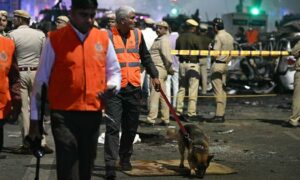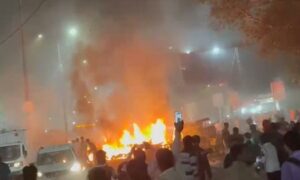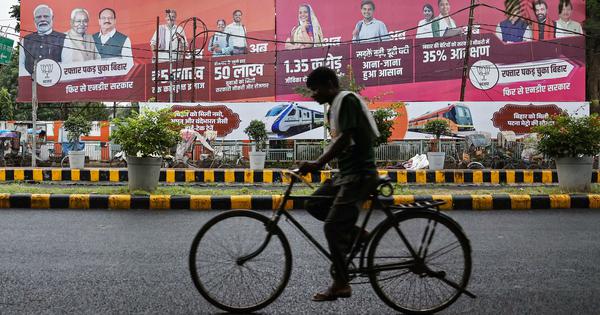
As Bihar votes in the second phase of the state election on November 11, the opposition parties are celebrating what they believe is a groundswell of popular support. There is talk of an “exemplary wave” in favour of the Opposition, of successful mobilisation against the Election Commission’s controversial Special Intensive Revision of voter rolls and of a powerful narrative around “vote chori”, or vote theft, that has resonated with the public.
The mood in Opposition circles is cautiously optimistic, bordering on triumphant. They believe they have exposed the ruling Bharatiya Janata Party’s machinations and awakened public consciousness.
But this optimism, however heartening it may appear, rests on a fundamental misreading of the political moment we inhabit. It treats as a genuine democratic contest what has become, in essence, a carefully choreographed performance – one where the outcome is predetermined by those who control not just the stage but the very rules of engagement.
The uncomfortable truth that the Opposition refuses to confront is this: the BJP has not merely fortified its electoral position through conventional political means but it has fundamentally captured the institutional architecture that determines electoral outcomes. The most consequential act in this capture – the subjugation of the Election Commission of India – has been met not with the sustained mass resistance it demanded, but with business-as-usual politics.
Fighting symptoms, ignoring the disease
The mobilisation of the Opposition parties against the Special Intensive Revision of electoral rolls in Bihar represents their organisational capacity but also their strategic myopia. During the exercise, the Election Commission had deleted approximately 65 lakh voters in Bihar’s draft electoral roll published on August 1, prompting allegations that this was a targeted effort to disenfranchise voters unlikely to support the BJP and its allies.
Opposition parties claimed the intensive revision was a partisan tool, alleging mass deletions of voters, and launched a “Voter Adhikar Yatra” or voters rights march across the state. The Supreme Court intervened, directing the Election Commission to publish details of deleted voters and make the list searchable. This was projected as a victory for democratic forces.
But what was actually achieved was a partial, temporary mitigation of one specific tactic in one specific state. The fundamental problem – that the Election Commission itself has been transformed from an independent constitutional body into an instrument of the ruling party – remains not just unaddressed but largely unacknowledged in the Opposition’s discourse.
The final voter list released on September 30 showed a net reduction of around 47 lakh electors from the original rolls, despite the Supreme Court’s interventions. Moreover, the Special Intensive Revision required all voters to fill forms to be included in the voter list, with those whose names were not in the 2003 voter lists needing to provide additional documents.
Commonly held documents such as Aadhaar, voter ID cards and ration cards were not initially included as proof of identity for the exercise. This created enormous barriers for re-registration, particularly for migrant workers, a demographic that tends to vote against the BJP in significant numbers.
When the Election Commission eventually included Aadhaar as valid documentation, the Opposition celebrated. They celebrated the Supreme Court’s orders for transparency. They celebrated their rallies and yatras. But celebrating these defensive victories while the fortress itself has fallen is the politics of self-delusion.
Victory snatched at the counting table
To understand why optimism about Bihar 2025 may be premature, we need to revisit what happened in Bihar 2020 – an election that still haunts those who care about democratic integrity.
The 2020 Bihar election initially showed the Opposition-led Mahagathbandhan in the lead, but the National Democratic Alliance made a strong comeback as counting progressed, ultimately winning 125 seats to the Mahagathbandhan’s 110.
More tellingly, the vote share gap between the two alliances was virtually negligible: the National Democratic Alliance secured 37.26% while the Mahagathbandhan received 37.23%, a difference of only 12,768 votes out of over 3.14 crore polled, just 0.03% of the total.
Following the results, Tejashwi Yadav of the Rashtriya Janata Dal claimed to have “won 130 seats” and that “the mandate was in our favour, but the Election Commission’s results were declared in favour of NDA”. Yadav alleged that the Mahagathbandhan “lost about 20 seats” because of “irregularities” in the counting of postal ballots. He also claimed that the National Democratic Alliance won by “money, muscle power and deceit”.
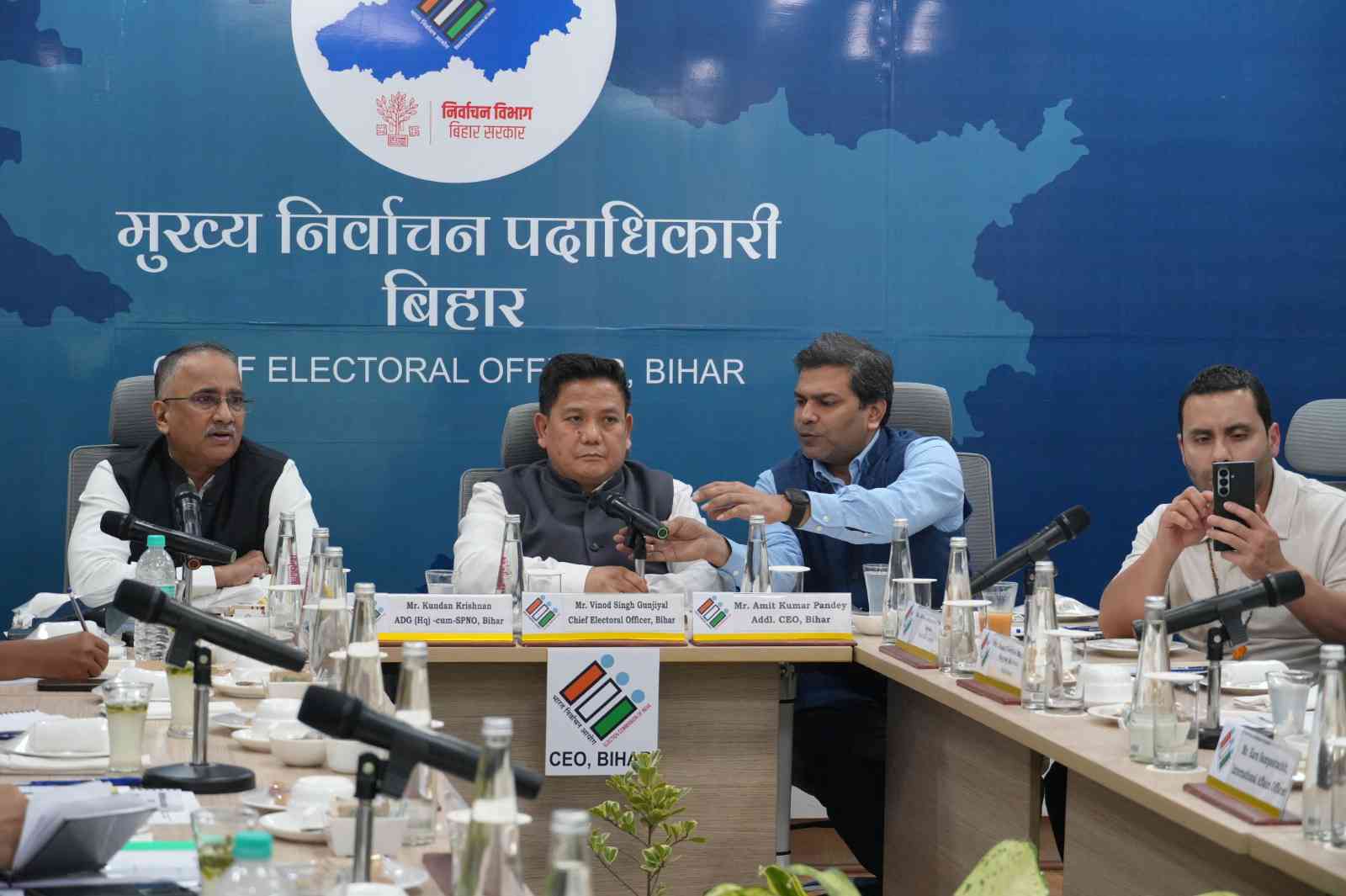
These were not frivolous allegations. Nearly one in five constituencies saw a victory margin of less than 2.5%, the highest proportion of closely fought seats in Bihar’s electoral history. In such wafer-thin margins, control over the counting process becomes decisive. And who controls the counting process? The Election Commission.
The Election Commission dismissed the claims as unfounded, adding that according to procedure, the postal ballots, including the invalid ones, were re-verified where the margin of victory was less than the number of invalid postal ballots. It claimed that it had counted random voter-verified paper audit trail that matched the count of the electronic voting machines. Case closed, as far as official records go.
The Opposition protested for a few days, filed some petitions, and then moved on. The BJP-Janata Dal (United) government was formed, and Bihar returned to “business as usual”.
This is the pattern that has been established: close elections in which the Opposition performs well are decided in favour of the National Democratic Alliance through processes controlled by an Election Commission that has demonstrated, time and again, its alignment with the ruling party’s interests. The opposition cries foul, the Election Commission dismisses the allegations and democratic norms are eroded further – but never intensely enough at any one moment to provoke the sustained resistance that might change the trajectory.
Democracy’s death knell
If there is a single moment that marks the death of electoral democracy in India as we knew it, it was not the introduction of opaque electoral bonds nor the misuse of investigative agencies nor even the capture of large sections of the media. It was the moment the Narendra Modi government successfully brought the Election Commission under its control – and the Opposition’s response was barely a whimper.
In March 2023, a five-judge Constitution Bench of the Supreme Court directed the creation of a committee comprising the prime minister, the leader of the Opposition and chief justice of India that would advise the President on appointments to the Election Commission, noting that impartiality of the poll body was key in ensuring free and fair elections in a democracy.
This was a landmark judgement that recognised a fundamental democratic principle: the court’s rationale was the need for an impartial mode of appointing election commissioners, concluding that the power of appointing election commissioners was not to be lodged exclusively with the Union executive.
The Modi government’s response was swift and brazen. On December 12, 2023, Rajya Sabha passed the Chief Election Commissioner and other Election Commissioners (Appointment, Conditions of Office and Terms of Office) Bill, 2023. It set up a committee comprising the prime minister, leader of opposition and a Union cabinet minister nominated by the prime minister instead of the chief justice of India. This gave the selection committee a majority of members from the government of the day.
Centre tables a bill in the Parliament to prescribe the selection process for Election Commissioners.
As per the Bill, CEC and ECs will be selected by a panel comprising Prime Minister, Opposition Leader and a Union Minister nominated by the PM.
Supreme Court had ruled in March… pic.twitter.com/etSYxi6mVQ
— Live Law (@LiveLawIndia) August 10, 2023
By replacing the chief justice with a nominee of the prime minister, the matter of selecting the chief election commissioner and other election commissioners came back under the Centre’s control. The government now has a 2-1 majority in the committee that appoints election commissioners. The prime minister and his chosen cabinet minister can outvote the leader of the opposition on every appointment.
This was the capture of the referee by one of the teams, and an effective end of the institutional autonomy that is supposed to guarantee free and fair elections.
How did the Opposition respond? With petitions to the Supreme Court. With statements to the press. With protests that lasted a few days. But not with the kind of sustained, mass civil disobedience that such a moment demanded. There were no bandhs that shut down the country. No Opposition-ruled states refused to cooperate with the newly constituted Election Commission. No sustained campaign that made the government pay a political price so severe that it had to retreat.
Instead, we saw what we always see: Opposition politicians issuing strongly-worded statements, civil society organisations filing public interest litigations and then everyone returning to business as usual. Elections will still be contested. The theatre of democracy will continue.
Illusion of democracy
The Opposition’s conduct creates a dangerous illusion: that despite everything, the democratic process remains fundamentally intact; that elections are still meaningful contests; that mobilisation and campaigning can overcome institutional capture.
This illusion serves the interests of those who have captured democratic institutions by providing them with democratic legitimacy. As long as Opposition parties continue to participate in elections under the current framework, as long as they treat electoral victories as possible and defeats as temporary setbacks rather than symptoms of systemic subversion, they validate a process that has been fundamentally compromised.
Consider the sheer brazenness of the institutional capture:
-
The Election Commission now has commissioners appointed by a government-dominated committee. The Chief Election Eommissioner Gyanesh Kumar has dismissed allegations of “vote chori” or vote theft as baseless. “Can vote chori happen in such a transparent process?” he asked, defending the Special Intensive Revision that deleted millions of voters.
-
CEC seems to act as the BJP’s spokesperson: The Chief Election Commissioner Gyanesh Kumar by his conduct and body language, the Opposition and others have observed, seems to present himself as a representative of the ruling part.
-
The timing of elections, the scheduling of phases, the deployment of central forces, the transfer of key officials, the scrutiny of Opposition financing while ignoring BJP’s unprecedented resources – all of this is in the hands of an Election Commission that has shown consistent bias.
-
The counting process, with its opaque procedures around postal ballots and verification of VVPAT or Voter verifiable paper audit trail in close contests, is entirely controlled by EC-appointed officers who serve at the pleasure of an EC leadership beholden to the government.
-
The constitutional remedy – the courts – moves slowly while election results are declared, governments are formed and fait accompli becomes accepted reality.
The Opposition’s response to this capture has been to play harder within the rigged game rather than to question the legitimacy of the game itself. They invest enormous resources in campaigning, mobilisation, alliance formation – all important activities, but ultimately futile when the umpire is biased and the scoreboard is controlled by the opposing team.
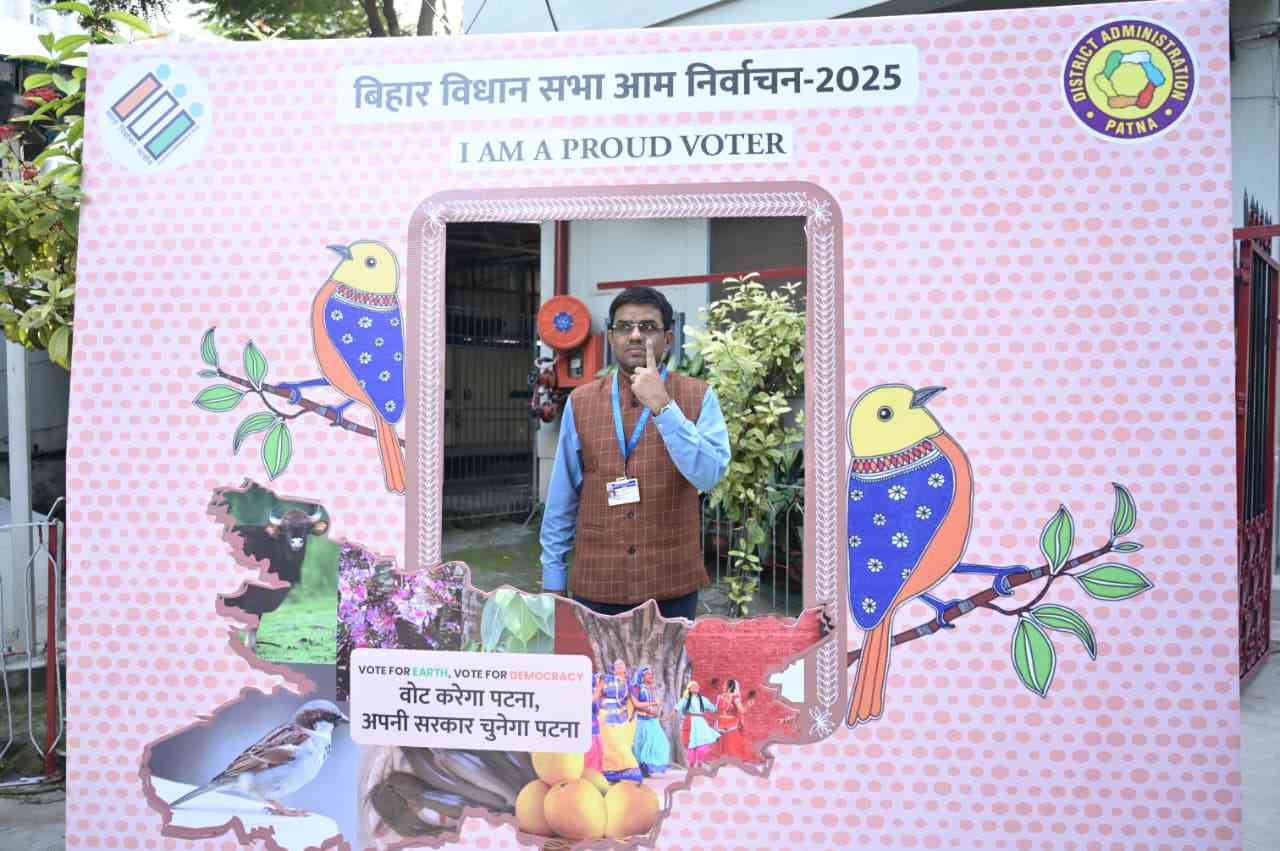
Missing the forest for the trees
A perfect example of the Opposition’s tendency to focus on trivialities while the edifice crumbles is the recent clamour over Nitish Kumar not being declared as the chief ministerial face of the National Democratic Alliance in Bihar.
The Opposition discourse has been consumed with this question: is this a sign of their weakness? Does this mean they are unsure of victory? Is Nitish Kumar being sidelined?
This is the politics of distraction masquerading as political analysis. Nitish Kumar, who has switched alliances more times than most people change their phones, who abandoned the opposition to rejoin the National Democratic Alliance knowing full well what it represented, is somehow being treated as a figure whose political fortunes warrant serious opposition concern.
The hand-wringing over Nitish Kumar’s status accomplishes two things, both harmful to the Opposition’s cause: first, it centres a turncoat as somehow important to political discourse, legitimising the very politics of opportunism that has eroded institutional integrity. Second, and more importantly, it directs attention away from the fundamental question of whether the electoral process itself retains integrity.
Who the National Democratic Alliance declares as their chief ministerial candidate is utterly irrelevant if the Election Commission can manipulate voter rolls, if counting processes can be compromised, if the entire institutional apparatus of election management serves one party’s interests.
But it is precisely these kinds of “political” questions – coalition dynamics, leadership contests, seat-sharing arrangements – that dominate Opposition discourse, because they allow everyone to pretend that we’re still operating in a normal democratic framework.
The predetermined outcome
Given this context, let us speak plainly about Bihar 2025: barring an internal decision by the BJP to allow a loss for strategic reasons (perhaps to maintain some veneer of democratic credibility), the National Democratic Alliance will win this election regardless of how people vote.
The Opposition may have mobilised effectively. The public may genuinely want change. There may indeed be an anti-incumbency wave. None of this matters when the institution tasked with conducting free and fair elections is no longer independent.
Bihar is far too important a state for the BJP to concede. It is the third-most populous state, a crucial part of the Hindi heartland that forms the BJP’s core support base and a state where loss would create dangerous momentum for the Opposition ahead of the 2029 general elections. Given the stakes, and the institutional control the BJP now exercises, why would we expect any outcome other than a victory for the National Democratic Alliance?
The most likely scenario is precisely what was seen in 2020: a close contest that creates the appearance of democratic competition, perhaps even early leads for the Opposition that generate excitement, followed by a gradual shift during counting that results in a narrow but decisive victory for the National Democratic Alliance.
The margins will be close enough to be plausible, but comfortable enough to form a government. There will be allegations of irregularities, which the Election Commission will dismiss. The Opposition will protest for a few days, then accept the result and move on to the next election.
This strikes a pessimistic note but is a realistic assessment based on observed patterns of institutional behaviour under the current regime.
What should have been done
The appropriate response to the capture of the Election Commission was not litigation and limited mobilisation but sustained mass civil disobedience that shut down normal political functioning until the independence of electoral institutions was restored.
When Parliament passed the Election Commissioners Act in December 2023, the entire Opposition should have been on the streets – not for a day or a week, but for as long as it took. Opposition-ruled states should have declared they would not cooperate with an Election Commission appointed through a compromised process.
Civil society should have organised mass movements demanding the restoration of institutional independence. The goal should have been to make governance impossible until democratic norms were restored.
This did not happen because the Opposition still fundamentally believes (or wants to believe) that the system remains functional enough that normal political competition can succeed. They critique specific decisions of the Election Commission while accepting its basic legitimacy. They challenge individual appointments while recognising the authority of the compromised appointment process. They fight battles while ceding the war.
The Opposition’s failure to treat the capture of the Election Commission as the fundamental crisis it was, is either a catastrophic failure of strategic thinking or a deeper complicity with a system that, even in its compromised form, provides them with political space, resources and status.
Either way, it is a failure that will haunt Indian democracy for generations.
Eyes wide open
The most damaging aspect of the current situation is that the appearance of electoral competition is maintained. Elections are still held. Opposition parties still campaign. Some Opposition candidates still win. It creates the illusion of democratic choice while the fundamental conditions for meaningful democracy have been undermined.
This is more dangerous than outright authoritarianism, because it is harder to resist. When elections are cancelled and Opposition parties are banned, the authoritarian nature of the regime is clear and resistance movements can organise around that clarity. But when elections continue to be held, when Opposition parties can still function (within limits), when some victories are still allowed (in less crucial contests), it becomes much harder to mobilise resistance.
The Opposition’s participation in this theatre is crucial to maintaining it. As long as major Opposition parties continue to contest elections under the current framework, treating them as legitimate exercises in democratic choice, they provide the system with the democratic credentials it needs to function.
Writer and civil rights activist Anand Teltumbde is a former CEO, Petronet India Limited and a professor at IIT Kharagpur and the Goa Institute of Management. He is the author most recently of The Cell and the Soul: A Prison Memoir.
📰 Crime Today News is proudly sponsored by DRYFRUIT & CO – A Brand by eFabby Global LLC
Design & Developed by Yes Mom Hosting

